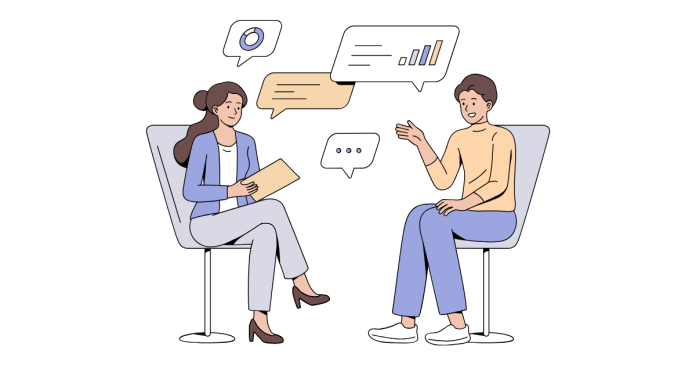Interviews are a widely used method for collecting information in research, recruitment, and other fields. They involve a one-on-one or group conversation between an interviewer and interviewee(s) to gather insights, opinions, or evaluate skills. Here’s a breakdown of the advantages and disadvantages of interviews:
Advantages of Interviews
- In-depth Information:
- Interviews allow for detailed exploration of a topic, enabling the interviewer to gather comprehensive insights into the interviewee’s thoughts, experiences, and opinions.
- Clarification and Follow-up:
- The interviewer can ask follow-up questions or clarify responses, reducing ambiguity and ensuring accurate data collection.
- Adaptability:
- Interviews can be tailored to the individual or situation, making them flexible for a wide range of contexts (e.g., structured, semi-structured, unstructured).
- Non-verbal Communication:
- Observing body language, tone, and facial expressions can provide additional insights beyond spoken words.
- Encourages Participation:
- Interviews are personal and engaging, encouraging interviewees to share more than they might in a survey or questionnaire.
- Rich Data Collection:
- Open-ended questions allow interviewees to provide detailed, qualitative data that is often more nuanced than quantitative responses.
- Improves Understanding:
- For recruitment or research, interviews provide a better understanding of a candidate’s skills, personality, or experiences.
Disadvantages of Interviews
- Time-Consuming:
- Conducting and analyzing interviews can take a lot of time, especially with unstructured or open-ended formats.
- Costly:
- Interviews require significant resources, including skilled interviewers, travel expenses, and time for transcription and analysis.
- Subjectivity:
- Responses can be influenced by the interviewer’s biases, leading to subjective interpretations of the data.
- Limited Sample Size:
- Due to time and resource constraints, interviews are often conducted on smaller sample sizes, which can affect generalizability.
- Interviewer Influence:
- The presence of the interviewer might make the interviewee nervous or alter their responses (Hawthorne effect).
- Not Always Reliable:
- Responses depend on the honesty and memory of the interviewee, which can sometimes lead to inaccurate or incomplete information.
- Data Analysis Challenges:
- Analyzing qualitative data from interviews is complex and requires expertise in identifying patterns and themes.
- Cultural and Language Barriers:
- Differences in cultural background or language proficiency can affect communication and lead to misunderstandings.
Conclusion
Interviews are a powerful tool for collecting detailed and nuanced information but require careful planning and skilled execution to overcome challenges like subjectivity, cost, and time. They are best used when in-depth insights are needed and resources are available to support their thorough implementation.


